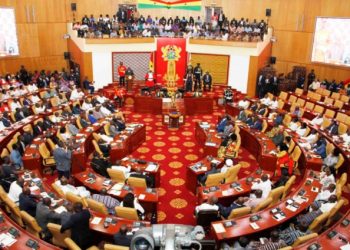Ghana’s Central Bank, the Bank of Ghana (BoG), has engaged in an alarming spree of money printing over the past three years, injecting vast sums into the economy under the guise of “monetary inflation” to stimulate growth and reduce unemployment.
However, as we will reveal in this article, this policy is far from beneficial. Instead, it proves detrimental to the economy, causing the impoverishment of the poor and middle class, exacerbating wealth inequality, strengthening government authority in an alarming manner, and setting the stage for high inflation. In reality, the true motive behind this inflationary policy lies in the government’s desire to channel wealth to a select group of government cronies.
World Bank Report
A recent World Bank report revealed that the inflation caused by the Bank of Ghana’s excessive money printing plunged nearly 850,000 Ghanaians into poverty by the end of 2022. This alarming statistic highlights the failure of the government’s supposed policy to improve the lives of the average Ghanaian. Instead, ill-advised economic policy-making and implementation have resulted in more people becoming poorer.
Inflation
Inflation can be classified into two types: demand-pull inflation and cost-push inflation. Demand-pull inflation occurs when the demand for goods and services surpasses the economy’s supply capacity, leading to price increases.
This can be influenced by factors such as rising consumer income, population growth, increased government spending, or changes in interest rates that encourage borrowing and spending. On the other hand, cost-push inflation arises when production costs rise, and these increased costs are transferred to consumers in the form of higher prices.
This can happen due to factors such as higher raw material or energy costs, increased wages, or government regulations elevating production expenses. Both types of inflation have adverse effects on the economy, such as reduced purchasing power, decreased confidence among consumers and businesses, and higher interest rates.
Money Is Not Wealth
Renowned economist Hans F. Sennholz highlights that money, as a medium of exchange, is not synonymous with wealth. Money merely serves as a measure of wealth, while real wealth constitutes the goods and services produced in an economy that enhance people’s lives. Therefore, increasing the money supply does not create genuine prosperity, as it does not generate more tangible goods like food, houses, cocoa, gold, steel, lumber, or oil.
When money is injected into the economy, it does not benefit every member of society equally. Instead, the new money flows through specific channels, such as loans, bailouts, or asset purchases by the central bank, benefiting particular individuals, businesses, or government entities.
This unearned gain allows the recipients to purchase more goods, and services, or make larger investments than they otherwise could, leading to a relative impoverishment of the rest of society. As George Reisman emphasizes, inflation results in an unearned gain for those who introduce new money into the economic system through spending, while others suffer corresponding losses.
IMF Intervention
The situation in Ghana has prompted the International Monetary Fund (IMF) to intervene, requiring the government to sign a Memorandum of Understanding (MoU) with the Bank of Ghana. The objective of this action was to eliminate the harmful practice of monetary financing, where the government borrows directly from the central bank. This practice had severe repercussions, contributing to a soaring inflation rate of over 54% in 2022.
As newly printed money permeates the economy, it drives prices upward, effectively reducing the purchasing power of everyone else. In essence, the recipients of the new money gain access to goods, services, and assets that others could have acquired if not for the actions of the Bank of Ghana.
This process, as explained by Murray Rothbard, becomes a race, with winners gaining access to the new money earliest, while the latecomers, often referred to as the “fixed income groups,” bear the losses. Wealth redistribution, favoring the government and its beneficiaries, can be likened to a covert form of taxation.
Why Are Ghanaians Suffering?
The ongoing impact of the Bank of Ghana’s excessive money printing demands a closer look at the long-term consequences it inflicts on the lives of Ghanaians and the overall economic stability of the nation. Here are the major ramifications of this troubling monetary approach:
- Deepening Poverty and Inequality: The inflation resulting from the surge in money supply disproportionately affects the poor and middle class. As prices rise faster than their incomes, the purchasing power of these groups diminishes, making essential goods and services less affordable. Consequently, the wealth gap widens, with a privileged few benefiting from the newly injected money, gaining more control over resources and assets, further exacerbating income inequality.
- Erosion of Savings and Retirement Funds: Inflation gradually erodes the value of money over time, causing savings and retirement funds to lose their purchasing power. This puts the financial security of hardworking Ghanaians at risk, especially retirees who rely on fixed incomes to sustain their livelihoods. The real value of their savings diminishes, leaving them vulnerable to financial hardships.
- Reduced Investment and Economic Growth: High inflation erodes confidence in the stability of the currency, making people hesitant to invest in long-term ventures or make significant purchases. Uncertainty also affects businesses, leading to reduced investment in productive assets and expansion. Consequently, economic growth slows down, hindering job creation and overall prosperity.
- Fiscal Mismanagement and Government Overreach: The temptation for the government to rely on inflation to finance its expenses instead of implementing responsible fiscal policies is significant. By monetizing its debt, the government can fund its operations without directly increasing taxes or borrowing from the public. However, this approach is unsustainable and often leads to a loss of fiscal discipline, enabling excessive government spending and an expansion of its authority at the expense of individual liberties.
- Vulnerability to External Shocks: An economy dependent on inflationary policies becomes more susceptible to external shocks, such as changes in global commodity prices or shifts in international trade dynamics. These shocks can lead to currency depreciation, exacerbating inflation, and adding further strain to the economic well-being of citizens.
- Diminished International Competitiveness: Persistent inflation can erode a country’s competitive advantage in the global market. As domestic prices rise, the cost of producing goods and services increases, making exports less competitive and imports more expensive. This hinders economic diversification and sustainable development.
To alleviate the detrimental effects of inflation and foster a healthier economic environment, policymakers and the central bank must adopt prudent and responsible monetary policies. Measures such as targeting a stable and low inflation rate, promoting transparency in economic decision-making, and implementing structural reforms to boost productivity and investment can contribute to sustainable economic growth and improved living standards for all Ghanaians.
In conclusion, the consequences of the Bank of Ghana’s inflationary policies have had far-reaching effects on the welfare of Ghanaians. Addressing the root causes of inflation and adopting sound economic principles are essential to safeguarding the future of the nation and ensuring a more equitable and prosperous society for all its citizens.
Cooperation among all stakeholders, including the government, financial institutions, businesses, and citizens, is crucial in building a strong and resilient economy that prioritizes the well-being of its people over short-term gains.
By Korsi Dzokoto
Economic Policy & Financial Analyst















